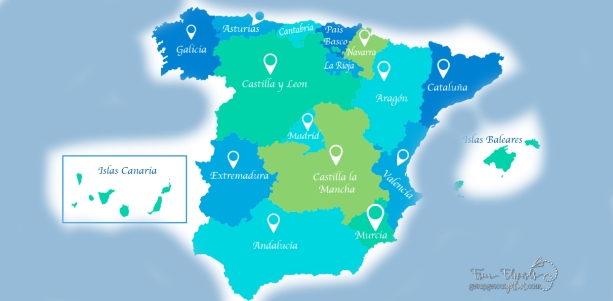
Ministerio de Educación
NALCAP
Auxiliares de Conversación
North American Language &
Culture Assistants in Spain
Tapas, siestas, sunshine… Ever dreamt about living in Spain?
Spain is ramping up efforts to improve the nations´ English skills by inviting native English speakers into the classroom, and thousands of young people move to Spain every year to teach English, learn Spanish, explore the beautifully diverse country and of course, drink lots of Spanish wine 🍷.
I’ve been living in Spain on and off for over ten years (crazy, right?) and it all started one day back home in California when I heard in passing about becoming an ‘auxiliar de conversación.’
And the rest, as they say, is history.

I moved to Spain as part of the Ministerio de Educación North American Language & Culture Assistant Program (a mouthful, and more commonly known as Auxiliares de Conversación).
I lived and taught in Madrid for two incredible years, and later moved to the Canary Islands as a Language Assistant with BEDA (Bilingual English Development & Assessment) where I´m still soaking up the sea and sun today. You can read about my experience with BEDA here.
After all that, I worked myself all the way up from a little auxiliar assistant teacher to a proper English teacher with residency in Spain (a story for another day). Needless to say, over the years I´ve learnt a thing or two about moving to Spain, teaching English and living abroad.
Here, you can find everything you need to know about:
- What is a Language and Culture Assistant/Auxiliar de Conversación?
- What are the logistics of moving to Spain as an auxiliar de conversación (pay, locations, visas, etc)?
- What do you need to know about the teaching English in Spain? (Auxie FAQs)
- What are the pros and cons of being an auxiliar de conversación?
- When and how can you apply to teach English in Spain as an auxiliar de conversación?
North American
Language & Culture Assistants:
What´s an Auxiliar de Conversación?

First of all, let´s get one thing straight. This program is referred to a million different ways:
Language & Culture Assistants
NALCAP
Spain Cultural Ambassador Program
Ministry Program
Ministerio Program
Government Program
Auxiliares de Conversación…
You get the picture. It seems that they’re trying to rebrand officially as the “North American Language and Culture Assistant Program (NALCAP)” but for simplicity sake I´m just gonna use the name it´s most commonly referred to: auxiliar / auxiliares de conversación 😉.
Auxiliar de Conversación Program
Maybe you´ve heard of the other Language Assistant Programs – BEDA, MEDDEAS, Conversa, etc.
But this is the most well-known of the Language Assistant Programs in Spain – the OG, the top dog, the big Kahuna. The program is run by the Spanish Ministry of Education and was the first of its kind. It´s been around for over a decade and brings in thousands of auxiliares de conversación each year.
Auxiliar means ¨assistant¨ in Spanish, and the program is based on the idea that native English-speaking auxiliares de conversación will improve the overall level of students’ spoken English. Auxiliares are usually from North America, but can also be from the UK, Australia & New Zealand, India and occasionally other countries.
Auxiliares de Conversación:
Placements & Locations
There are over 2,300 Language & Culture Assistants teaching English through the government program in thousands of schools all around Spain. You select your regional preferences when you apply, but ultimately the decision is up to the powers that be.

Over the years some regions have backed out and rejoined the program, but as of 2018, all of the autonomous communities in Spain were accepting auxiliares.
There are a few differences between the program in Madrid and outside of Madrid, so let´s start there…
Auxiliares de Conversación
in Madrid
Madrid Program Dates & Monthly Stipend
Due to the higher cost of living, auxiliares de conversación in Madrid make a bit more money per month and work a few more hours per week than those in other parts of Spain. Those working in Madrid earn a monthly stipend of €1000/month for 16 hours per week in the classroom (about (€15.62/hour).
Auxiliares de conversación typically work in the schools from October 1 to June 30, however some schools only retain their language assistants until May 31.
Madrid Health Coverage
Private Health Care in Madrid
Private health insurance is provided for Language Assistants, though the company and quality vary depending on which region you’re placed in.
Madrid Language Assistants typically have good coverage. When I lived in Madrid, we were covered by MAPFRE and a couple of years ago they switched to Generali. Both companies provided more than adecuate coverage that insured health and dental care.
Spanish Public Health Care in Madrid
Language & Culture Assistants in Madrid do not pay into Spanish Social Security and are not eligible for public health care.
Madrid Orientation
Orientation will be held in Madrid in mid to late September and provides a run down on how to complete the visa process as well as suggestions for finding housing and setting up a Spanish bank account. Plus, it´s a great opportunity to meet other new English assistants in Madrid.
Last year, Madrid orientation was held on September 26, 2021.
Auxiliares de Conversación
Outside of Madrid
Program Dates & Monthly Stipend Outside Madrid
Cost of living is generally cheaper outside of Madrid and auxiliares de conversación work less hours and make less money there – to the tune of €700/month for 12 hours/week in the classroom (€14.58/hour).
In the Canary Islands and perhaps in other regions, auxiliares are sometimes given the option to work an extra 4 hours a week at the same pay rate, meaning they work Monday to Friday (16 hours/no 3 day weekends) and earn about €933/month.
Auxiliares de conversación placed outside of Madrid tend to start work at the beginning of October and finish at the end of May.
Valencia Language Assistant Hours & Pay
I´ve heard through the grapevine that Language Assistants in Valencia are working 16 hours/week for €1000/month (like those in Madrid), but as the program there is just coming back after a history of not having their sh*t together (and taking ages to simply pay their auxiliares), I won´t confirm this until I´m certain.
Health Coverage Outside of Madrid
Private Health Care Outside of Madrid
Outside of Madrid, health coverage seems to vary quite a bit from region to region. In the Canary Islands, for example, Language Assistants only receive emergency coverage through a travel insurance company, and I’ve heard it can be a nightmare to get reimbursed for services. Additionally, some regions provide dental coverage and do not.
This might be a biggie for you to consider if you have any preexisting conditions, so do some research in the various regional Auxiliar Facebook groups to find out about health coverage in the regions you´re interested in.
Spanish Public Health Care Outside of Madrid
Historically, auxiliares de conversación don´t pay into Spanish Social Security and are not eligible for public health care, but recently I’ve heard that some regions are changing this. I´ve heard Murcia and Aragon mentioned but I can´t confirm how true the rumors are yet, so for now assume you’re not eligible and be pleasantly surprised if you are 😉.
Orientation Outside of Madrid
Orientation varies from region to region, but will likely be held in your assigned region in October, probably after you´ve already started in the school.
Auxiliares de Conversación
Frequently Asked Questions
What kind of visa do you need to live in Spain?
The auxiliares de conversación role is considered to be a sort of internship and a means of obtaining higher education through sharing cultural experiences, so you will be required to obtain a student visa before arriving to Spain.
Auxiliares are not employed in Spain and do not have the right to work in Spain. The monthly stipend is considered a cost of living grant.
Is the monthly stipend enough to live on?
The stipend is more or less enough to live off, but the bang for your buck will depend a lot on what city or town you’re placed in and your personal spending style.
Most Language & Culture Assistants supplement their income with private tutoring as a side hustle, and you’ll have plenty of time to do so and still live it up in Spain with so few hours a week.
My first year in Madrid I paid €385/month rent (including bills), went out way too often, travelled a lot around Spain and Europe, taught 0 private classes and only occassionally dipped into my US savings. Since then though, rent has skyrocketed in Madrid and the only way you´re paying less than €450 a month is searching for an apartment outside of the city center.
My second year in Madrid, I realized I wasn´t a teenager and dipping into savings wasn´t the most brilliant of strategies, so I started teaching about 5 hours of private classes a week at €20 bucks a pop, upping my monthly income by €400 a month.
In the Canaries, I earned €1,100 per month working with BEDA and taught from 1-4 hours of private classes a week at €15-€20 an hour. I could easily get away with not doing private classes here, but since it´s more expensive to travel from the islands it´s a nice little extra.
Is the monthly stipend taxable?
The money paid to Auxiliares de Conversación is considered a living stipend or grant and is not taxed within Spain, nor is Social Security taken out in most cases. You will not be required to file taxes in Spain.
US citizens, however, are required to report the stipend on their US taxes. The monthly stipend is not enough to reach the taxable income base in the US, but you´re still required to file. Whether or not you owe money will depend on the income you´ve earned from other jobs in the calendar year.
Is the payment reliable?
Unfortunately, it totally depends. In the two years I worked in Madrid I always received payments on time, but I’ve heard horror stories from around the country, especially in Murcia, Cataluña, Valencia and some areas of Andalucía. I´ve heard of some Language Assistants waiting until almost Christmas to get paid, meaning you´ll have to be prepared with savings to not only cover the move, but September – December rent plus life in general.
It’s absolutely something to take into consideration when choosing your preferred regions, and the main reason I didn’t apply for Andalucía, my favorite part of Spain. I definitely recommend joining the Language Assistant Facebook group to snoop around and see if your desired region is one with a bad reputation for late payments.
Does the Ministry of Education provide support for Language Assistants?
Support?? LOL. The Language & Culture Assistant program is famous for two things:
1. Being a bad ass way to get a Visa to move to Spain and
2. Dissapearing once you get here.
They host orientation sessions in each of the regions in September or early October where they´ll fill you in on most of the basics and where you can meet other auxiliares and then they send you away to fend for yourself.
As far as the nitty-gritty – immigration paperwork, getting your NIE, opening a bank account, etc. – you’re pretty much on your own. It will seem incredibly daunting at the time, but it is absolutely doable. Even when it can seem totally overwhelming, just remember that thousands of others have done it before you! There are plenty of resources out their in BlogLand and auxiliar alum are really helpful in the Facebook groups.
What´s the deal with the required MOOC coursework?
As of the last couple of years, Language Assistants who wish to renew for a second year have to complete an online course called the MOOC, comprised of a few homework assignments, quizzes and a portfolio.
I believe this became a requirement to prove that Language Assistants are actually students (as per the visa) and not in fact ¨working¨ at the schools. From what I’ve seen, it’s not difficult and most people don’t seem to stress about it too much.
What are the schools like?
Auxiliares work in public schools and the student ages ranges from preschool to 18 years old, and occasionally older students studying English as part of a vocational program (similar to community colleges in the USA).
As far as your role and responsibilities will be concerned, it can vary a lot from one school to the other. Some schools look after you, team teach and collaborate on lesson plans, while others prefer a more “sink or swim” approach.
What´s the schedule like?
Generally primary schools have classes from 8-1, lunch break from 1-3, and class again from 3-5.
Secondary schools tend to hold class from 8-2 and then sweet, sweet freedom.
You will definitely be at the school more than the 12 or 16 hours that you´re assigned due to breaks and scheduling, so just bring a book and make the most of your time.
What are the roles & responsibilities of the Language Assistant?
My first year in Madrid, my hours were split between two schools and my second year I stayed on with just one, and I had great experiences with both. I’m a hands on kind of person and prefer to take on the “lead teacher” role, but I definitely feel that they would have been there to support me had I not.
Not everyone has such a great experience. I’ve heard of some LAs who are expected to do everything from day one, others who are expected to do nothing and spend most of their school days twiddling their thumbs and dying of boredom, and others who just have a generally crap work environment – gossipy coworkers, unruly students, whatevs.
It’s all just luck of the draw. Hopefully you get lucky, but if not, at least you’re living in Spain 😜! And if you´re looking for lesson plans and activity inspiration, feel free to check out the EFL Activity section of my blog.
Auxiliares de Conversación:
The Good, The Bad & My Two Cents
The Good
- The hours are amazing.
12 or 16 hours a week
4 days a week
3 day weekends
Even when you factor in private classes, commute time and breaks at school that aren´t counted as in-class hours, you still have time to live your life! As someone who worked full-time from highschool and throughout university, this is glorious on so many levels. - Money, money, money. While no one heads to Spain to get rich teaching English, the payrate is higher than other Language Assistant Programs in Spain. BEDA, for example, pays only about €12.50/hour per hour, while the hourly rate with the ministry program is about €15.00.
- Visa. Unlike our EU friends across the pond, North Americans don´t exactly have the easiest time getting Visa´s to work in Europe. The auxiliar program sponsors you to secure a 9 month student visa to live and travel freely throughout Europe.
The Bad
- Is anyone out there? The Ministerio program is infamous for their lack of communication and disorganization. Truly embodying the Spanish stereotype of mañana you will find emails go unanswered and phones ring and ring into the abyss, meaning you´re gonna have to make things happen for yourself.
The good thing is that there are so many people in Spain who´ve done this before you and you´ll find plenty of advice, tips and support on the various Facebook groups and forums. - Long commutes: You pick your preferences, but you never really know where you´ll be assisgned to. The public transportation in Madrid is phenomenal, so even if your school is an hour away you can get comfy in the high speed train and read/nap/lesson plan the ride away.
In other regions, however, you might get placed in a tiny pueblo an hour from the nearest city with unreliable public transportation. Especially in Andalucía, I´ve heard of many auxiliares who have to make the choice between living in the boondocks, commuting an hour+ away on a bus that always comes late, or begging their coworkers for a carpool (which they sometimes charge you for). - Late payments: Honestly it kind of pisses me off that they can´t get this together. A few years ago, auxiliares in Cataluña (Barcelona region) protested and went to the media because months had passed without a single payment. While it´s definitely not the norm, it absolutely does happen and if, like me, you don´t get a lot of help from back home, this could potentially put you in a pretty crappy position.
My Two Cents
When it’s all said and done, I have zero complaints about my experience as an auxiliar de conversación in Madrid. I applied on a whim and due to various life stuff decided to accept on a whim as well. While some things were overwhelming at the start (visas, immigration paperwork, finding an apartment), it was all doable and it absolutely made me a better, stronger and more worldly person accomplishing all of that on my own.
Apply as a Language & Cultural Assistant
Requirements
- Be a native English speaker

- Hold a US or Canadian passport
- Hold a BA or BS before October 2019
- Be in good physical and mental health
- Have a clean background check
- Be less than 60 years of age (most LAs are between 21-35)
- Be able to speak some basic Spanish
Anyone who fits these requirements will be given a placement as long as you get your application in correctly and on time.
My first year, I appied the day before the deadline, with an application number somewhere around 4,660 (not an exaggeration) and I got placed. Granted, not until August, meaning I had to scramble like a mad woman to get everything for my visa together, but I did absolutely get a placement. Obviously, the earlier you apply, the better.
*Word on the street is that they might be accepting applicants with an AA from Community Colleges in the near future. I´ll update this space once I´ve confirmed!
When to Apply
Like I said, basically anyone who meets the requirements and gets their documents submitted on time will get a placement, but the program is competitively first come, first served and if you have your heart set on a specific region, student age group, etc, it’s imperative to have your documents ready and your Profex login created before the application goes live so that you can send it in ASAP.
No joke, those already renewing from within Spain apply at midnight the night applications go up to ensure they receive early placement (inscrita) numbers.
To put it into perspective: the last time I applied as a backup (in case my residency wasn´t approved), I
- Updated my CV and all of my documents in the Profex application website before the application went live (in early January).
- When the clock struck midnight on the day the application went live, I logged in and finished everything else in record speed (keeping in mind that I know Profex, have managed it many times, and speak fluent Spanish).
- Submitted my application at 12:08 and my inscrita number was 116. In 8 minutes, 115 people had already submitted their applications before me. If you´re serious about applying, start preparing your application and documents in December so that you´ll be ready to go in January.
How to Apply as an Auxiliar de Conversación

1. Online Profex Application for Auxiliares de Conversación
The application process is done through the online Profex system which is all in Spanish.
To submit your online application, you´ll need
- A PDF image of your valid passport photo page.
- A PDF of your university diploma(s) or official academic transcripts.
- A 250 word cover letter or statement of purpose in English or Spanish, signed, dated and addressed to the education advisor for your corresponding office (PDF).
- A Letter of Recommendation (on official letterhead) from a professor or employer (PDF).
Here you can find the detailed steps to find your way around the application:
North American Language & Culture Assistant Application Guiedlines

2. Mail in Profex Printouts
After Submitting your online Profex application, you must send the following documents to your corresponding office
- PDF Printout from Profex (hand signed and dated)
- PDF Checklist from Profex (hand signed and dated))
*There are some special requirements for applicants from New York or who hold dual passports with a European country.
3. Review Your Status Online via Profex
Once mailed, wait for your status on Profex to change to Admitida, which means they´ve received all of your official in. Next, wait for your status to change to aceptada. This means you´re in!
4. Accept Your Placement
Once you receive the email saying that you have been aceptada (adjudicada la plaza en (REGION)), you will be given just 3 days to accept your placement. The email will include instructions on how to do this.
And then… you´re in! Tapas, sunshine and siestas await 💃
Official Program Links
Cultural Ambassadors: North American Language and Culture Assistants
North American Language and Culture Assistants FAQ
Related Posts
Teach English in Spain: BEDA Language Assistants
Moving to Spain: What to Do Before You Arrive
Finding a Flat in Spain: Apartment Hunting
Packing Dos & Don´ts for Moving Abroad
Overcoming Homesickness Abroad
6 Years in Spain: Reflections of a Life Abroad
Questions? Comments? You know what to do 👇





That’s definitely a great way to practice your Spanish. Spain would be my first choice, if I was going to take a year and teach English.
LikeLike
Very informative, good to know important things like the tax treatment ! Thanks for sharing !
LikeLike
It is so wonderful that you were able to do this…plus in such a beautiful area. 😉 I wasn’t familiar with this program in particular but have seen many language schools around the world. I’ve thought about doing it while at my house in Panama but not sure about being tied down. Congrats!
LikeLiked by 1 person
Wow you live in Panama?! So cool! I imagine you could find some work teaching English there without a long term contract 😉
LikeLike
What a great opportunity to travel around Spain while getting paid. This is definitely something I will suggest to my daughter as she gets older. She would love the opportunity to travel and paint the Spanish landscapes. And once we get our kids outbid school, my wife and I won’t be too old to give it a shot ourselves. Thanks for an honest review of the program.
LikeLiked by 1 person
It’s honestly such a great way to see Spain and Europe without breaking the bank! Earning money and living abroad in my twenties was life changing for me 🙂
LikeLike
It’s so wonderful to read about your experience with teaching English in Spain. It’s a beautiful initiative by the country as well to promote the language while also merging cultural boundaries amongst everyone in the process. Thanks for compiling all your learnings about the program through this post, it was good to learn something new.
LikeLike
Language teaching and living in a beautiful country like Spain is like having the best of both worlds. Some great advice here for wannabe-language-teachers. Do you plan to repeat the experience in another country?
LikeLike
It is great to know about your experience of teaching English in Spain. It is good to know that less than 60 years can also apply so it can be benefitting to many middle-aged people. Thanks for sharing all the details about how to apply.
LikeLike
Living in another country and getting paid to teach is such a great way to experience another culture and part of the world. This guide will surely be helpful for those interesting in teaching English in Spain.
LikeLike
6 years!? Wow, you must really love it there and I don’t blame ya! I’ve always thought about the possibilities of teaching English abroad and getting to travel at the same time, but I’m not so sure I make for a great teacher myself hahaa. Either way, thanks for introducing us to this program and I’m sure this will benefit many!
LikeLike
Working abroad is always a great idea, especially when you’re young. And teaching your mother tongue abroad while learning another language in parallel is definitely a good way to discover more about a particular country’s culture. Spain is a wonderful country, so keep traveling exploring it in depth as well as the rest of Europe! 😉
LikeLike
careful working abroad cause like in the usa you got to pay irs tax here to spain govt you cant just earn without paying.. the local authorities are online lookinng for adverts. with the crisis they look under every stone.. 2 americans in 2018 went home early cause they just taught and earned but didnt give the govt its cut.. be careful.. working is fun but dont get in truoble..
LikeLike
Not to worry, this program is run through the Spanish government and everything is legal and above board. Language Assistants are considered students with student visas and their work in the classroom is considered an internship, thus the monies provided are living stipends and not taxable wages. US citizens will have to claim these monies on their US taxes but are not required to file Spanish taxes 🙂
LikeLike
Though I’ve never thought of doing it in Spain until now I have done a TEFL and considered teaching English in Asia in the future. Up until now I am still a little unsure it if is for me but I would love to try it out.
LikeLiked by 1 person
If you have a TEFL it should be easy to find work teaching abroad. For me it provides a perfect opportunity to really get to know a country and culture, working with locals and learning from the students, not to mention the ability to travel around in depth within the country or region you´re living in. I hope you give it a shot one day!
LikeLike
Holy cow! 115 people in 8 minutes? I see why you have it down to a fine-tuned science. Eso es increíble! I would qualify for all of this and would have loved to do it if I were single. I loved teaching summer English camps in the Canaries in the summers. In our main town we taught, we taught in the primary school. Hilarious that they are good at getting you there and great at disappearing once they do!
LikeLike
What a cool experience! We are currently traveling and working as online English teachers but we teach children in China. We’ve just arrived in Europe and Spain is on our list. Great info!
LikeLike
It is so wonderful that you were able to do this and live in such a beautiful country. I haven’t heard of this program, but it sounds quite similar to English teaching programs in Japan. I thought about teaching English abroad when I was younger and do occasionally still think about it 🙂
LikeLike
Great info and post! That’s true – it is perfect balance of work and travel, while learning local language and exploring the country.
LikeLike
Super informative post! If I was considering teaching English in Spain, this would be a go to. I love the midnight rush to log in and complete an application to ensure placement … competitive and that is a tribute the how popular and successful the program is.
LikeLike
I hear about people doing this all the time but never really know what goes into it. thanks for sharing your awesome experience. I learned so much. What a cool way to spend a few years and I’m especially jealous of your stint in the Canary Islands. 😉
LikeLike
Wow, what a fantastic experience on many fronts. This will not only allow you to travel, master a new language, learn a new culture, but also develop good professional and life skills. Any future employer, should you choose that direction, should recognize the value that this experience has brought you. A great detailed account that any one who is considering doing this can be well prepared for. Thank you for sharing.
LikeLike
This is great information to know! I’ve been considering teaching English when I move to Spain/Portugal at the beginning of next year! I love the in-depth information provided about what you make in different regions too, extremely insightful and helpful. Thanks for sharing!
LikeLike
That was such an incredable experience and so useful information! Thank you!
Does anybody know how reliable is the Madrid Lifestyle Program for Non EU (1year/€1600)? any experience and advices? Would it be applicable for a citizen of Tajikistan?
Any information would be much appreciated!
LikeLike
Hi Jane, I´m not familar with this particular program, but perhaps one of our other readers may be able to comment and let you know about their experiences.
LikeLike
Thank you, very informative!
LikeLike
Happy to help 🙂
LikeLike
It is always better to study a foreign language in a different country where you won`t be surrounded by your native language and the result will be way better because of the natural accent.
LikeLike
How do you know which is your number in the long string of numbers?
Mine is: 20_2AXC000622
is it 20 or 622?
Thanks 🙂
LikeLike
May I know if your time in Spain using your Auxiliares student visa, qualifies to be included when computing for Residency application? I understand only 50% of a student visa stay in Spain may be used in the application.
Thank you very much.
Evelyn
LikeLike
If you’re officially married in Spain, yes!
LikeLike